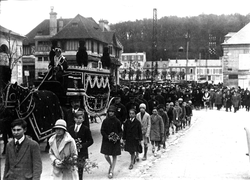Caroline Rémy de Guebhard
Caroline Rémy de Guebhard | |
|---|---|
 Carte-de-visite of Séverine by Nadar | |
| Born | 27 April 1855 Paris, France |
| Died | 24 April 1929 (aged 73) Pierrefonds, France |
| Nationality | French |
| Other names | Séverine |
| Occupation(s) | Anarchist, Journalist, Feminist |
| Movement | Feminism, Anarchism, Populism |
| Spouses | |
| Signature | |
Caroline Rémy de Guebhard (27 April 1855 – 24 April 1929) was a French journalist with anarchist, socialist, communist and feminist views, best known under the pen name Séverine.[1] She has been called the first professional journalist in France.[2]
Around 1880, Caroline Rémy became involved with Jules Vallès' socialist publication, Cri du Peuple. Vallès eventually gave her control over the newspaper due to his poor health. Becoming increasingly militant, she befriended journalist and feminist Marguerite Durand but, following a confrontation with the Marxist Jules Guesde, left the newspaper in 1888. She continued writing for other papers in which she promoted women's emancipation and denounced social injustices, including the Dreyfus affair. In 1897, she began writing for Durand's feminist daily newspaper La Fronde.[3]
A staunch leftist, Rémy backed a number of anarchist causes, including the defense of Germaine Berton, and participated in the 1927 efforts to save Sacco and Vanzetti. She supported the Russian Revolution of 1917 and, in 1921, joined the French Communist Party, resigning a few years later in order to maintain her membership of the Human Rights League.[4]
Bernard Lecache, a founding member of the Committee of Honor of International League Against Anti-Semitism (LICA), (now International League Against Racism and Anti-Semitism (LICRA)), wrote her biography. Her portrait was painted by Pierre-Auguste Renoir in 1885 and now hangs in the National Gallery of Art in Washington, DC.

Caroline Rémy died in 1929 at her home in Pierrefonds, Oise department in the Picardy region of France. Some of her papers can be found in the Bibliothèque Marguerite Durand in Paris.
Shortly before her death, she took part in the campaign to support the candidacy of Dr. Albert Besson, who was elected councilor of the district Saint-Fargeau, general counselor of the Seine then deputy chairman of the Council of Paris and the general council of the Seine. In 1933, in her memory, he had the Paris council vote for the attribution of the name "Séverine" to the square created at his initiative Porte de Bagnolet (Paris 20).
She was nominated for the Nobel Peace Prize in 1920, 1922, 1924, 1927 and 1929 by Lucien Le Foyer.[5]
Gallery
[edit]- Séverine
See also
[edit]References
[edit]- ^ a b "Séverine (1855–1929)". Encyclopedia.com. Retrieved 27 May 2019.
- ^ "Séverine, première grande journaliste, écrivaine et féministe française". France Inter (in French). 24 February 2019. Retrieved 21 August 2024.
- ^ "Séverine De son vrai nom Caroline Rémy, insurgée toute sa vie". L'Humanité (in French). 9 July 2012. Retrieved 27 May 2019.
- ^ "Caroline Remy, known under the name Severine". The Daily Bleed: A Calendar. 28 October 2005. Archived from the original on 28 October 2005. Retrieved 27 May 2019.
- ^ Mehlin, Hans (21 May 2024). "Nomination%20Archive". NobelPrize.org. Retrieved 21 August 2024.
External links
[edit] Media related to Séverine at Wikimedia Commons
Media related to Séverine at Wikimedia Commons- Caroline Remy at the Anarchist Encyclopedia
- 1855 births
- 1929 deaths
- French anarchists
- French Communist Party members
- French socialists
- French suffragists
- People associated with the Dreyfus affair
- Writers from Paris
- French socialist feminists
- 19th-century French women writers
- 19th-century French journalists
- 20th-century French women writers
- 19th-century French women journalists
- 20th-century French journalists



